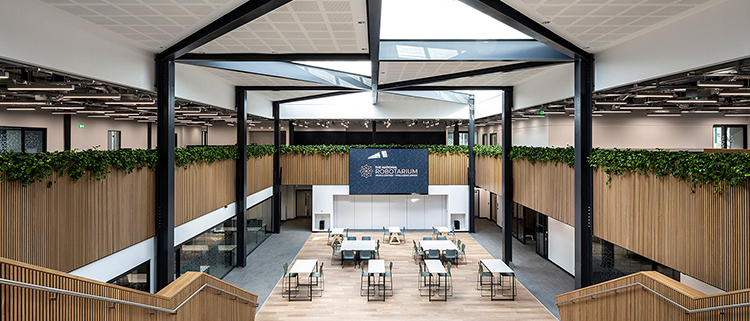Making an impact on the world stage – the National Robotarium celebrates its first birthday
Since opening its doors in September 2022, the National Robotarium has earned a world-class reputation in advancing research in robotics and artificial intelligence (AI).
More than a dozen companies developing unique solutions to global challenges across society and industry have benefitted from the National Robotarium’s state-of-the-art facilities, expert engineering advice, and industry collaboration, with its tenant companies tackling issues facing the agriculture, health and social care and energy industries.
Developing talent is a key goal for the National Robotarium and under the leadership of Stewart Miller, the team has significantly expanded, with 50 new jobs created in the first year in engineering, public engagement, professional services, business development and research.
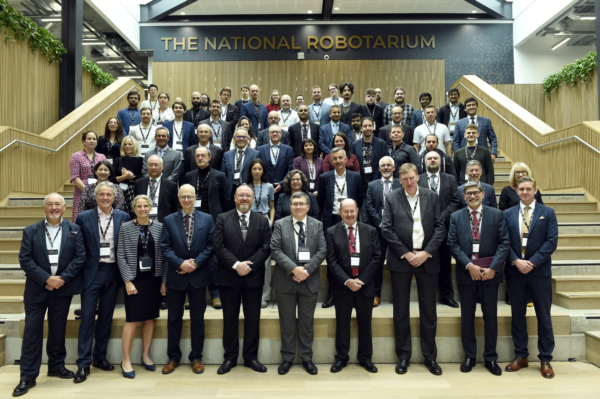
The National Robotarium launch event at Heriot-Watt University on 28 September 2022
Engaging with the next generation of robotics and AI engineers is a key goal. More than 10,000 young people, many of them from disadvantaged backgrounds, have been involved with the National Robotarium since its inception, and their dedicated outreach and engagement team have delivered over 50 in-person and online events over the past 12 months. These events have been staged with the support of a host of industry and educational partners including the Glasgow Science Centre and social enterprise group, Datakirk.
Home to world-class laboratory and industry facilities, the National Robotarium supports research and development in Robotics and Autonomous Systems (RAS), Human and Robotics Interaction (HRI) and Precision Laser Applications.
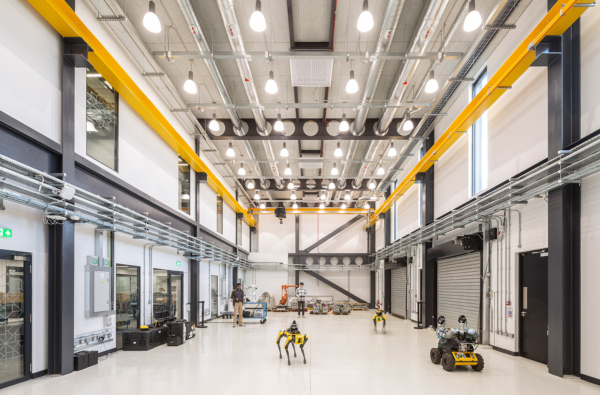
The Robotics and Autonomous Systems (RAS) Lab
Among its tenants is TouchLab, which has developed a first-of-its-kind robot equipped with e-skin, the most advanced electronic skin ever developed to transfer a sense of touch from its robotic hand to clinicians, giving them the ability to ‘feel’ their patients remotely.
In agritech, Crover has built a prototype of a unique robot which ‘swims’ through grain bulks, monitoring environmental conditions to ensure crops are stored more efficiently.
Finally, Bioliberty have developed the LifeGlov, a soft robotic glove that can be used to restore upper limb mobility in stroke patients. The company has received £2.2 million in new funding for further development.
High profile research projects include UNITE, which is developing electric remotely operated vehicles (eROVs) to perform maintenance tasks on offshore wind turbines with the aim of drastically improving health and safety for offshore employees working in dangerous and inhospitable environments.
The FEATHER project, a collaboration with researchers from the School of Informatics at the University of Edinburgh, is developing artificial intelligence and socially assistive robots to detect urinary tract infections (UTIs). Meanwhile, the National Robotarium is working closely with the university’s Lyell Centre on a prototype called Smartrawl, which is developing a revolutionary AI-empowered fishing net device that helps fishing trawlers prevent bycatch.
Fostering relationships with researchers and industry around the world is part of the National Robotarium’s mission and global coverage of its work in the media has played an essential role. Research stories and industry partnership announcements in the last 12 months have been covered by media from the USA to Asia, Saudi Arabia to South Africa.
The facility, a partnership between Heriot-Watt University and Edinburgh University, is part of the Data-Driven Innovation initiative. It is supported by £21 million from the UK Government and £1.4 million from the Scottish Government through the £1.3 billion Edinburgh and South East Scotland City Region Deal – a 15-year investment programme jointly funded by both governments and regional partners.
The National Robotarium was also lauded as the ‘gold standard’ in a Scottish Parliament debate on the future of robotics technology in Scotland and the UK. A debate received cross-party support, with ministers in agreement that the UK would greatly benefit by prioritising growing its robotics skills, technology, and manufacturing capabilities.
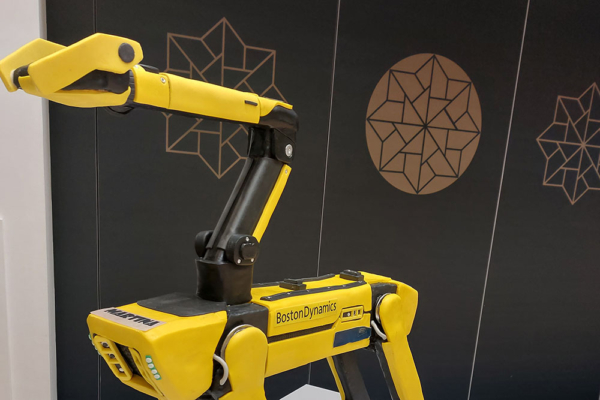
Is it Spot or is it cake?
At the National Robotarium’s 1st birthday party in September 2023.
Stewart Miller, CEO of the National Robotarium, said: “The team at the National Robotarium has delivered an exceptional first year for the facility and our partners, helping to develop solutions which are going to make us all safer, healthier, and more productive. We’ve been building strong relationships with industry and engaging with schools and organisations to open young minds to a future where robotics and AI systems will be central to our lives.
“With the combined robotic and AI experience of Heriot-Watt and the University of Edinburgh, the National Robotarium is paving the way for the UK to take a globally significant role at the forefront of developments in AI and machine learning technology but this is only the beginning as we work to accelerate our impact on the world stage.”
UK Government Minister for Scotland, Malcolm Offord, said:
“The first anniversary of the National Robotarium is a welcome opportunity to celebrate the incredible work and pioneering research carried out over the last year. From robots to help farmers and fishermen to those helping improve patient care, they are delivering vital solutions to real-world issues through their AI and robotic technology.
“The UK Government is investing £21 million in the National Robotarium as part of the £300 million Edinburgh and South East Scotland City Region Deal.”
Colin Cook, Director of Economic Development, Scottish Government, said:
“The Scottish Government’s National Strategy for Economic Transformation sets out a long term commitment to building a green, wellbeing economy in which Scotland builds clusters of successful businesses in new markets and industries.
“As we accelerate towards net zero and a low carbon economy, Scotland has the potential to be a world leader in new high-value and innovative sectors such as Robotics & Autonomous Systems (RAS). The National Robotarium is a crucial asset because it offers access to internationally competitive innovation facilities and expertise that support Scotland’s high-value manufacturing capabilities.
“It also represents a catalyst for the Robotics industry around which to coalesce and shape the broader development of robotics research, design and manufacture in Scotland, driving economic growth and raising Scotland’s profile in the global Robotics marketplace.”
DDI’s Director, Jarmo Eskelinen, said:
“The National Robotarium is a vital part of the wider DDI platform – six innovation hubs across the City Region. One year after opening, the companies, staff, and researchers at the National Robotarium are off to a great start, working to benefit society and many industry sectors.

